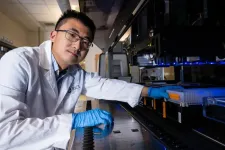(Press-News.org) Kosali Simon, PhD, M.A., a professor with the Paul H. O’Neill School of Public and Environmental Affairs and a Regenstrief Institute research scientist; and Katherine Baicker, PhD, University of Chicago provost, will co-lead an expected nearly $16 million National Institutes of Health’s (NIH) National Institute on Aging (NIA) program to explore critical aspects of healthcare delivery for individuals living with Alzheimer’s disease and related dementias (ADRD).
This five-year research initiative aims to identify and address barriers to equitable and effective healthcare for this growing patient population. The initiative will include collaboration with the National Bureau of Economic Research, IU School of Medicine and Regenstrief’s IU Center for Aging Research.
Dr. Simon will serve as the project lead for “Provider-Patient/Caregiver Racial Concordance and Equity in Health Care Systems: Their Influence on Health and Healthcare Outcomes for Populations with ADRD,” which will examine these relationships between healthcare providers and patients and how they impact healthcare use and health outcomes. Using decades of Medicare data from rural and urban areas, the project explores the prevalence, drivers and effects. The study will compare ambulatory care settings, where patients may choose providers, to emergency departments, where assignments are more random.
Regenstrief research scientists Nicole Fowler, PhD, MHSA, and Jennifer Carnahan, M.D., MPH, M.A., will work alongside Dr. Simon on the research project as co-investigators.
Malaz Boustani, M.D., MPH, founding director of the Sandra Eskenazi Center for Brain Care Innovation and the Center for Health Innovation and Implementation Science and a research scientist in the IU Center for Aging Research at Regenstrief, also will be a core leader for the project.
Kosali Simon, PhD, M.A.
In addition to her role as a research scientist in the William M. Tierney Center for Health Services Research at Regenstrief Institute, Kosali Simon, PhD, M.A., is a distinguished professor, Herman B. Wells Professor and Paul O’Neill Chair at Indiana University, Bloomington, O’Neill School of Public and Environmental Affairs. She also is the associate vice provost of health sciences for the IU Bloomington campus. A health economist, her research focuses on the impacts of state and federal healthcare policies on health and related outcomes, especially among at-risk populations. She is an elected member of the National Academy of Medicine.
END
Research team to study critical aspects of Alzheimer’s and dementia healthcare delivery
2025-01-03
ELSE PRESS RELEASES FROM THIS DATE:
Major breakthrough for ‘smart cell’ design
2025-01-03
HOUSTON – (Jan. 3, 2025) – Rice University bioengineers have developed a new construction kit for building custom sense-and-respond circuits in human cells. The research, published in the journal Science, represents a major breakthrough in the field of synthetic biology that could revolutionize therapies for complex conditions like autoimmune disease and cancer.
“Imagine tiny processors inside cells made of proteins that can ‘decide’ how to respond to specific signals like inflammation, tumor growth markers or blood sugar levels,” said Xiaoyu Yang, a graduate ...
From CO2 to acetaldehyde: Towards greener industrial chemistry
2025-01-03
Acetaldehyde is a vital chemical used in making everything from perfumes to plastics. Today, its production largely relies on ethylene, a petrochemical. But increasing environmental concerns are pushing the chemical industry to reduce its reliance on fossil fuels, so scientists have been searching for greener ways to produce acetaldehyde.
Currently, acetaldehyde is produced through the so-called “Wacker process”, a chemical synthesis method that uses ethylene from oil and natural gas with other chemicals such as strong acids, i.e. hydrochloric acid. The Wacker process not only has a large carbon footprint ...
Unlocking proteostasis: A new frontier in the fight against neurodegenerative diseases like Alzheimer's
2025-01-03
Scientists have uncovered a powerful ally in the fight against neurodegenerative diseases: a nucleolar complex that plays a pivotal role in maintaining cellular health through protein homeostasis (proteostasis), by which cells maintain the balance and proper functioning of their proteins. By suppressing this complex, researchers have shown it’s possible to dramatically reduce the toxic effects of Alzheimer’s-causing proteins, boosting the cell’s natural defenses through enhanced degradation of hazardous proteins. This mechanism regulates proteostasis across tissues by modulating TGF-β signaling, a pathway involved in cell growth, differentiation, ...
New nanocrystal material a key step toward faster, more energy-efficient computing
2025-01-03
CORVALLIS, Ore. – Scientists including an Oregon State University chemistry researcher have taken a key step toward faster, more energy-efficient artificial intelligence, and data processing in general, with the discovery of luminescent nanocrystals that can be quickly toggled from light to dark and back again.
“The extraordinary switching and memory capabilities of these nanocrystals may one day become integral to optical computing – a way to rapidly process and store information using light particles, which travel faster than anything in the ...
One of the world’s largest social programs greatly reduced tuberculosis among the most vulnerable
2025-01-03
Brazil’s Bolsa Família Program (BFP), one of the world’s largest conditional cash transfer programmes, was responsible for the reduction of more than half the number of tuberculosis cases and deaths among those living in extreme poverty and indigenous groups, shows a large study coordinated by the Barcelona Institute for Global Health (ISGlobal), a centre supported by “la Caixa” Foundation, the Institute of Collective Health, and the CIDACS-FIOCRUZ in Bahia, Brazil. The findings, published in Nature ...
Surprising ‘two-faced’ cancer gene role supports paradigm shift in predicting disease
2025-01-03
UNDER STRICT EMBARGO UNTIL 10AM (UK TIME) FRIDAY 3 JANUARY 2025.
Peer reviewed | Observational study | Cells
A genetic fault long believed to drive the development of oesophageal cancer may in fact play a protective role early in the disease, according to new research published in Nature Cancer. This unexpected discovery could help doctors identify which individuals are at greater risk of developing cancer, potentially leading to more personalised and effective preventive strategies.
“We ...
Growing divide: Agricultural climate policies affect food prices differently in poor and wealthy countries
2025-01-03
“In high-income countries like the U.S. or Germany, farmers receive less than a quarter of food spending, compared to over 70 percent in Sub-Saharan Africa, where farming costs make up a larger portion of food prices,” says David Meng-Chuen Chen, PIK scientist and lead author of the study published in Nature Food. “This gap underscores how differently food systems function across regions.” The researchers project that as economies develop and food systems industrialise, farmers will increasingly receive a smaller share of consumer spending, a measure known as the ‘farm ...
New approaches against metastatic breast cancer: mini-tumors from circulating cancer cells
2025-01-03
Tumor cells circulating in the blood are the “germ cells” of breast cancer metastases. They are very rare and could not be propagated in the culture dish until now, which made research into therapy resistance difficult. A team from the German Cancer Research Center (DKFZ), the Heidelberg Stem Cell Institute HI-STEM* and the NCT Heidelberg** has now succeeded for the first time in cultivating stable tumor organoids directly from blood samples of breast cancer patients. Using these mini-tumors, the researchers ...
Loneliness linked to higher risk of heart disease and stroke and susceptibility to infection
2025-01-03
Interactions with friends and family may keep us healthy because they boost our immune system and reduce our risk of diseases such as heart disease, stroke and type 2 diabetes, new research suggests.
Researchers from the UK and China drew this conclusion after studying proteins from blood samples taken from over 42,000 adults recruited to the UK Biobank. Their findings are published today in the journal Nature Human Behaviour.
Social relationships play an important role in our wellbeing. Evidence increasingly ...
Some bacteria evolve like clockwork with the seasons
2025-01-03
Like Bill Murray in the movie “Groundhog Day,” bacteria species in a Wisconsin lake are in a kind of endless loop that they can’t seem to shake. Except in this case, it’s more like Groundhog Year.
According to a new study in Nature Microbiology, researchers found that through the course of a year, most individual species of bacteria in Lake Mendota rapidly evolved, apparently in response to dramatically changing seasons. Gene variants would rise and fall over generations, yet hundreds of separate species would return, almost fully, to near copies of what they had been genetically prior to a thousand or so generations of evolutionary pressures. (Individual microbes ...



